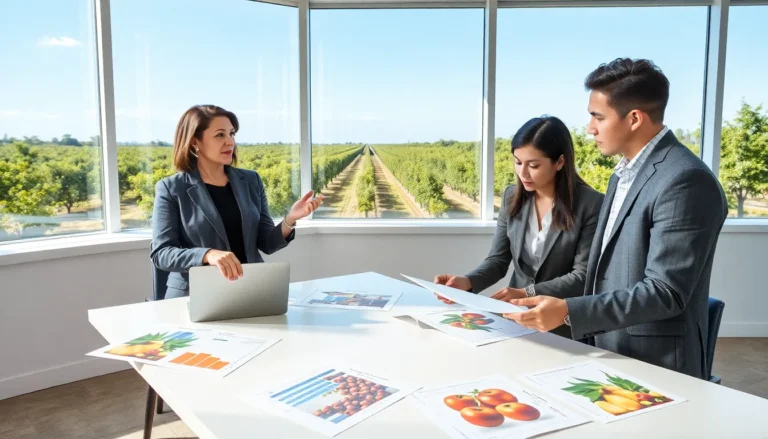Picture this: a bustling marketplace where every fruit trees muses whisper to each other about the best deals, while savvy orchard brokers liaison between eager buyers and sellers in a race to secure the juiciest yields. Sounds a bit surreal, right? Yet, that’s the vibrant world of orchard brokerage, where a good broker is worth their weight in gold, especially when navigating the delicious intricacies of agriculture. In this text, we’re diving into the refreshing juice that is orchard brokerage, exploring its many facets and how it can transform your farming business into a flourishing haven of profitability. Grab your gardening gloves.
Table of Contents
ToggleWhat Is Orchard Brokerage?

Orchard brokerage refers to the specialized services offered by brokers who help the buying and selling of orchards, pine trees, and other agricultural assets. This practice involves more than just listing properties: it’s a comprehensive approach to understanding market dynamics, pricing strategies, and buyer preferences. Think of orchard brokers as the matchmakers of the agricultural world. They create fruitful relationships between landowners and potential buyers, paving the way for successful transactions in an industry that often thrives on nuanced insights.
In essence, orchard brokers help streamline the complexities of agricultural real estate by offering targeted advice and market knowledge. They assess the land, evaluate yield potential, and understand the surrounding market conditions to ensure their clients get the best possible outcomes. For buyers looking to invest in an orchard or sellers endeavoring to get optimal value from their land, these brokers are indispensable allies.
The Role of Orchard Brokers
Orchard brokers play pivotal roles, almost like ensemble actors in a well-directed play. They wear many hats, serving as negotiators, advisors, and market analysts all rolled into one. Let’s break down their core functions:
Benefits of Using Orchard Brokerage
When you bring an orchard broker on board, the benefits are numerous. These professionals bring deep industry knowledge, helping clients understand local market trends and seasonality that can impact orchard values. They know which areas are poised for growth, allowing buyers to make informed decisions. Further, brokers often have access to a network of potential buyers and sellers, which opens up opportunities that a lone wolf approach might miss. This kind of insider access can make all the difference when time is of the essence.
Market Insights Provided by Brokers
Having an expert broker means having a continually updated feed of market insights. The agricultural market is ever-evolving, influenced by factors such as climate changes, consumer preferences, and technological advancements. Brokers keep clients informed about these fluctuations, so enabling better strategic decisions, be it planting a new variety of apple or sprinkling some organic fertilizer. The agricultural landscape is as fluid as the seasons: staying ahead requires a keen eye, and that’s where brokers shine.
Cost Efficiency and Bargaining Power
Finally, orchard brokers enhance cost efficiency. They have the experience necessary to negotiate terms that favor their clients. Whether it’s securing a lower purchase price or negotiating the sale of a well-established orchard, brokers help manage risks and unlock potential savings. They’re not just about making deals happen: they also bring value down the line through astute bargaining.
Challenges in Orchard Brokerage
Even though the benefits, there are challenges inherent in orchard brokerage that can make even the most seasoned broker sweat.
Navigating Legal and Regulatory Issues
One of the primary hurdles is navigating the complicated web of legal and regulatory issues surrounding agriculture. Different states have various laws governing land sales, water rights, and environmental protections. Compliance is non-negotiable but can be complex, often requiring a broker to work with legal specialists to ensure all deals are above board. The last thing any buyer or seller wants is to face legal repercussions after the sale.
Market Fluctuations and Their Impact
Market fluctuations present another dilemma. The agricultural market is notorious for its volatility. Factors like droughts, pest infestations, and shifts in consumer taste can dramatically affect orchard values. Brokers must adapt quickly, recalibrating their strategies to account for these changes. Their experience enables them to advise clients on the best risks to take and when to step back.
Finding the Right Orchard Broker
Selecting the right orchard broker can make or break a transaction. It’s akin to finding the right gardening tools for a specific project, having the right one can ease the process significantly.
Key Qualities to Look For
Firstly, knowledge and experience should be top of mind. Brokers who have walked the orchards themselves are likely to have a deeper understanding of what is at stake. Plus to expertise, look for strong communication skills. A good broker conveys market trends clearly and can negotiate effectively on behalf of their clients. Trustworthiness and transparent practices can’t be overlooked either: after all, a good rapport fosters open discussions and eventually better deals.
Leveraging Technology in Brokerage Services
Today’s brokers also leverage technology, utilizing digital tools for marketing properties, analyzing market data, and communicating with clients. From aerial drone imagery to advanced agricultural software, these innovations revolutionize the brokerage experience. They enhance the visibility of listings and provide clients with valuable data-driven insights.
The Future of Orchard Brokerage
As the agricultural landscape shifts, so too does the brokerage sector safeguarding orchards.
Trends Shaping the Industry
Several trends are transforming the orchard brokerage realm. Increasing consumer demand for organic produce is one notable area. This shift not only impacts the types of orchards in demand but also how brokers approach marketing and valuation. Besides, advancements in data analytics are bringing more sophisticated approaches to land assessment and valuation, enabling brokers to offer more tailored services to farmers.
Sustainability and Organic Orchards
Sustainability will also play a key role. With the world increasingly focused on responsible farming practices, brokers specializing in organic orchards are likely to find themselves at an advantage. They will need to stay well-informed about eco-friendly practices and organic certifications. As climate change continues to demonstrate its palpable impacts, brokers who prioritize sustainability will be indispensable in guiding clients toward future-ready investments.






